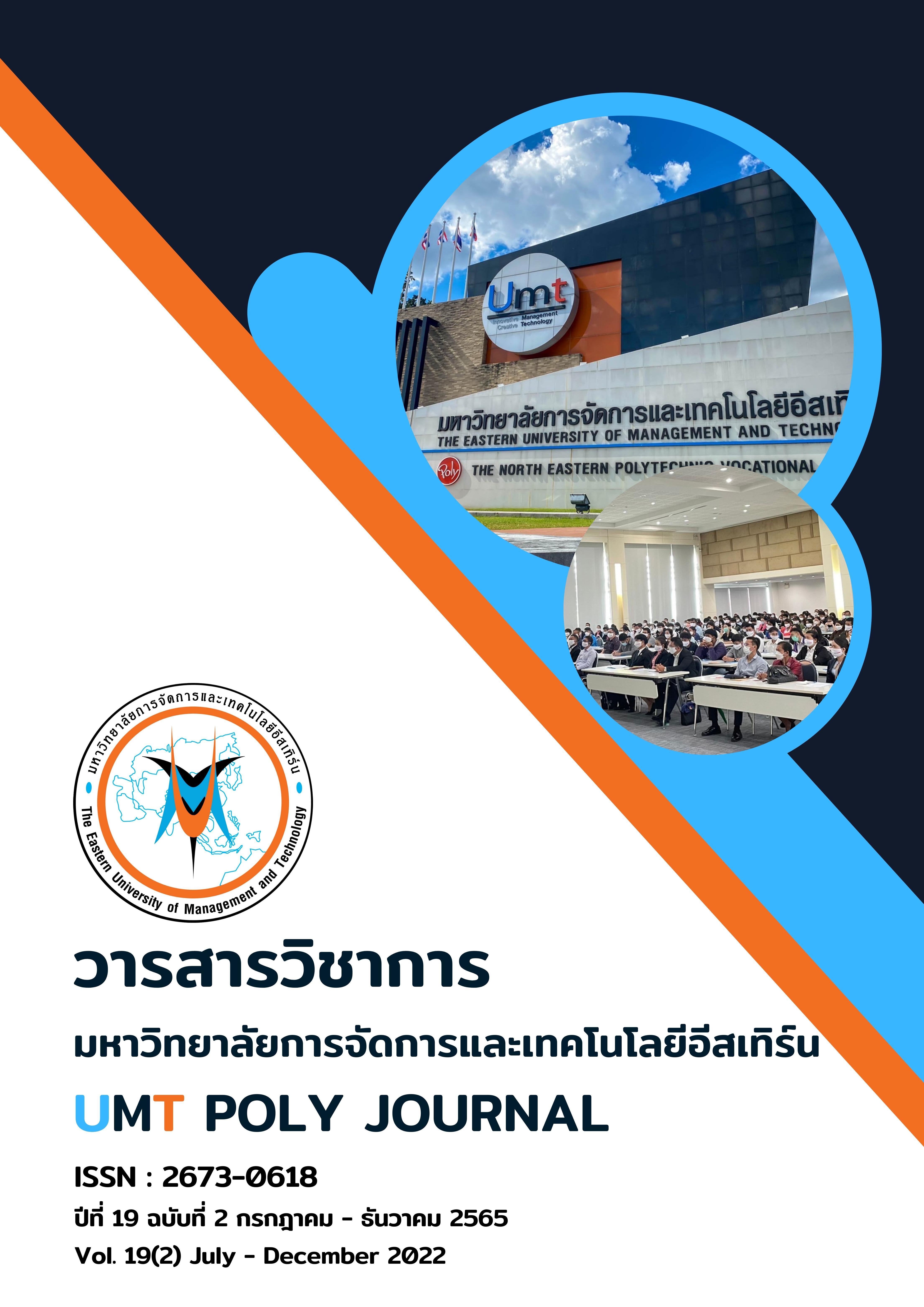คุณภาพบริการของพนักงานเคาน์เตอร์เซอร์วิสที่มีผลต่อความพึงพอใจ และความจงรักภักดีของลูกค้าธนาคารสาขา
คำสำคัญ:
คุณภาพบริการ, ความพึงพอใจ, ความจงรักภักดีบทคัดย่อ
บทคัดย่อ
งานวิจัยนี้มีวัตถุประสงค์วิจัยเพื่อศึกษาองค์ประกอบของคุณภาพบริการของพนักงานเคาน์เตอร์เซอร์วิสที่ส่งผลต่อความพึงพอใจและความจงรักภักดีของลูกค้าธนาคารสาขา โดยผู้วิจัยใช้แบบสอบถามเป็นเครื่องมือสำหรับนำไปเก็บรวบรวมข้อมูลตามความเห็นของลูกค้าธนาคารสาขา ของธนาคารกรุงเทพ จำกัด ที่อาศัยอยู่ในจังหวัดอุบลราชธานี ศรีสะเกษ และอำนาจเจริญ จำนวน 400 คน สถิติที่ใช้ในการวิเคราะห์ผล ได้แก่ ความถี่ ร้อยละ ส่วนเบี่ยงเบนมาตรฐาน สัมประสิทธิ์สหสัมพันธ์ และสถิติวิเคราะห์ถดถอยพหุคูณ ผลวิจัยพบว่า องค์ประกอบของคุณภาพบริการมีค่าเฉลียในระดับสูงทุกองค์ประกอบ และค่าเฉลี่ยองค์ประกอบของความพึงพอใจและองค์ประกอบของความจงรักภักดีของลูกค้าอยู่ในระดับปานกลาง นอกจากนี้ องค์ประกอบของคุณภาพบริการในด้าน ความน่าเชื่อถือ สิ่งแวดล้อม และการปฏิสัมพันธ์ โดยทั้งสามแนวทางส่งผลต่อความพึงพอใจของลูกค้าได้ที่ร้อยละ 45 และมีผลต่อความจงรักภักดีของลูกค้าได้ที่ร้อยละ 38 ตามลำดับ
Downloads
เอกสารอ้างอิง
กมลพิพัฒน์ ชนะสิทธิ์ และประสพชัย พสุนนท์. (2561). การสุ่มตัวอย่างและการผสานข้อมูลตามแบบแผนการวิจัยแบบผสมวิธี, วารสารวิชาการ มหาวิทยาลัยธนบุรี, 12(29), 147-158.
ธนาคารกรุงเทพ (2565). สืบค้นวันที่ 15 สิงหาคม 2565 จาก https://www.bangkokbank.com.
ประสพชัย พสุนนท์. (2557). ความเชื่อมั่นของแบบสอบถามในงานวิจัยเชิงปริมาณ, วารสารปาริชาต มหาวิทยาลัยทักษิณ, 27(1), 144-163.
วีระศักดิ์ จินารัตน์. (2564). ระเบียบวิธีวิจัยสมัยใหม่, พิมพ์ครั้งที่ 1; อุบลราชธานี, ยงสวัสดิ์ อินเตอร์กรุ๊ป จำกัด.
วีระศักดิ์ จินารัตน์. (2564). มาตรฐานงานวิจัยเชิงปริมาณและการพัฒนา, พิมพ์ครั้งที่ 1; อุบลราชธานี, ยงสวัสดิ์ อินเตอร์กรุ๊ป จำกัด.
Buttle, F. & Maklan, S. (2019). Customer Relationship Management: Concepts and
Technologies. Routledge.
Bagozzi, R.P. (1986). Attitude formation under the theory of reasoned action and a
purposeful behaviour reformulation. British Journal of Social Psychology,
(2), 95-107.
Drugdová, B. (2012). Comparison and analysis of the insurance market in Vyšegrad
countries. Series International Relations and Political Economy, 30, 323-337. Retrieved from http://www.palgrave.journals.com
Fornell, C. (1992). A national customer satisfaction barometer: the Swedish
experience. Journal of Marketing, 56(1), 6-21.
Gharakhani, D. , Farrokhi, M. R. , & Farahmandian, A. (2014). Customer's attributes and
organizational performance. American Journal of Industrial Engineering, 2 (1), 1 4. Retrieved from http://www.sciepup.com/journal/ajie
Hao, J.X., Yu, Y., Law, R. & Fong, D.K.C. (2015). A genetic algorithm-based learning
approach to understand customer satisfaction with OTA websites. Tourism Management, 48, 231-241.
IT. (2014). เจาะลึกสถิติธนาคารไทยที่ได้รับ engagement บนโลกออนไลน์ social media มากที่สุด, https://www.it24hrs.com/2014/banking-social-media-engagement/.
Jain, P. (2017). A comparative analysis of customer satisfaction towards electronic
banking service of state bank of India and CICI bank. Research Centre P.M.B. Gujarati Commerce College, Indore (M.P)
Kotler, P., Keller, K.L., Brady, M., Goodman, M. & Hansen, T. (2016). Marketing
Management, 3rd ed., Pearson, Harlow.
Karatepe, O.M., Yavas, U. & Babakus, E. (2005). Measuring service quality of banks:
scale development and validation. Journal of Retailing and Consumer Services, 12(5), 373-383.
Kalpadakis, A. , & Spais, G.S. (2015). Service quality and customer satisfaction in banks
during an economic recession and banking crisis period: The critical case of a Greek cooperative Bank. Innovative Marketing, 11(2), 1-14. Retrieved from http://www.businessperspectives.org
Nunkoo, R., Teeroovengadum, V., Thomas, P. & Leonard, L. (2017). Integrating service
quality as a second-order factor in a customer satisfaction and loyalty model. International Journal of Contemporary Hospitality Management, 29(12), 2978-3005.
Oliver, R.L. (2000). Customer satisfaction with service. in Swartz, T.A. and Iacobucci, D.
(Eds), Handbook of Services Marketing and Management, SAGE, London, 247-254.
Oliver, R.L. (1999). Whence consumer loyalty. Journal of Marketing, 63(4), 33-44.
Parasuraman, A., Zeithaml, V.A. & Berry, L.L. (1988). SERVQUAL: a multiple-item scale
for measuring consumer perceptions of service quality. Journal of Retailing, 64(1), 12-40.
Shostack, G.L. (1985). Planning the Service Encounter. In The Service Encounter;
Czepiel, J.A., Solomon, M.R., Surprenant, C.F., Eds.; Lexington Books: Lexington, MA, USA, 5243-254.
Smith, A.K., Bolton. R.N., & Wagner, J. A. (1999). model of customer satisfaction with
service encounters involving failure and recovery J. Mark. Res., 36, 356-372.
Teeroovengadum, V., (2022). Service quality dimensions as predictors of customer
satisfaction and loyalty in the banking industry: moderating effects of gender.
European Business Review, 34(1), 1-19.
Veldman, J. , Klingenberg, W. Gaalman, G. J. C. , & Teunter, R. H. (2014). Getting what
you pay for-Strategic process improvement compensation and profitability impact. Production and Operations Management, 23, 1387-1400. doi: 10.1111 / poms.12207
Williams, N.L., Ferdinand, N. & Bustard, J. (2019). From WOM to aWOM - the evolution
of unpaid influence: a perspective article. Tourism Review, 75(1), 314-318.
Yang, G., & Ming, L. (2014). Research of service industry's customer satisfaction
maximization problem based on multi-objective programming model. International Journal of u-and e-Service. Science and Technology, 7(5), 95-104. doi: 10.14257 / junnesst.2014.7.5.09
Zeithaml, V.A., Bitner, M.J. & Gremler, D.D. (2018). Services Marketing: Integrating
Customer Focus across the Firm. McGraw-Hill Education, New York, NY
ดาวน์โหลด
เผยแพร่แล้ว
ฉบับ
ประเภทบทความ
สัญญาอนุญาต
ประกาศลิขสิทธิ์
เนื้อหาและข้อมูลในบทความที่ลงตีพิมพ์ในวารสารวิชาการมหาวิทยาลัยการจัดการและเทคโนโลยีอีสเทิร์น ถือเป็นข้อคิดเห็นและความรับผิดชอบของผู้เขียนบทความโดยตรง ซึ่งกองบรรณาธิการวารสารไม่จำเป็นต้องเห็นด้วยหรือร่วมรับผิดชอบใด ๆ
บทความ ข้อมูล เนื้อหาหรือรูปภาพ ฯลฯ ที่ได้รับการตีพิมพ์ในวารสารวิชาการมหาวิทยาลัยการจัดการและเทคโนโลยีอีสเทิร์น ถือเป็นลิขสิทธิ์ของวารสารวิชาการมหาวิทยาลัยการจัดการและเทคโนโลยีอีสเทิร์น หากบุคคลหรือหน่วยงานใดต้องการนำข้อมูลทั้งหมดหรือบางส่วนไปเผยแพร่ต่อหรือเพื่อกระทำการใด ๆ จะต้องได้รับอนุญาตเป็นลายลักษณ์อักษรจากวารสารวิชาการมหาวิทยาลัยการจัดการและเทคโนโลยีอีสเทิร์นก่อนเท่านั้น




